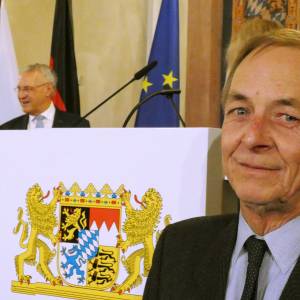Checkpoint Charlie
After yesterday's events, no one was keen to repeat last nights events.
We stayed in the West but did keep looking over our shoulders and dodging into doorways to check we weren't being followed. Nigel left his suit on this evening for dinner.
I had been at the Spandau Wienerwald today. Spandau the site of the infamous prison that not even Nigel with his experience of such place in the 21st century would feel happy in. A 19th-century prison that held up to 600 inmates and was used by the Gestapo to carry out much of its torture of anti-Nazi party civilians.
Its most famous prisoner was Rudolf Hess, Hitler's deputy who had on the 10th May 1941 made a secret flight to Scotland in the hope of brokering peace with the Allies, and was locked up there until he died in 1987 as the last prisoner there and it was demolished to prevent any attempt to make it an unofficial Nazi shrine.
As early as September 1940, Hess had secretly tried contacting the British Lord Hamilton by letter to get peace talks started but MI5 intercepted and kept the letter secret until shortly before Hess' flight the following year. He didn't know Hamilton who had been a "recommended" contact and was thought mistakenly to be from the opposition party opposed to war.
Hess managed to dodge the Spitfires when he was "picked up" as an enemy aircraft off the coast of Newcastle and flying as low as 50 metres made it to near Glasgow and the home of Lord Hamilton but couldn't find a landing spot. Running out of fuel, he climbed high and parachuted out.
Captured and under a false name, he did eventually get his request to meet Hamilton agreed to and revealed his real identity and purpose. In the meantime, Hitler was in a rage and worried the news would shake his allies such as Mussolini who may think Hitler was behind it.
The UK government under Churchill got involved but didn't take him seriously, more keen on getting as much information about Germany from him than in any peace negotiations - they treated him as mentally ill.
And so he was locked away in the UK, survived several suicide attempts and eventually faced war crimes at the 1945 Nürnberg Nazi trials and was intered for life in Spandau. He was spared execution (Wiki):
"Hess was found guilty on two counts: crimes against peace (planning and preparing a war of aggression), and conspiracy with other German leaders to commit crimes. He was found not guilty of war crimes and crimes against humanity."
A strange story and one wonders what may have happened if he had been taken seriously! Perhaps a few million lives could have been saved for a few weeks of negotiation. Not a glorious episode to join some of Churchill's other dubious decisions in his career.

Comments New comments are not currently accepted on this journal.